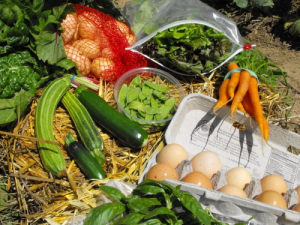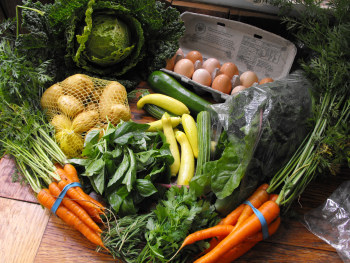
CSA and Eating in Season

I've been wanting to write a post about what
we've learned from a summer experimenting with CSAs, but the taboo
against speaking honestly about money has held me back. Every
time I start the post, I realize I need to go check on the chickens, or
sweep the floor, or wash my hair. :-)
|
What
is a CSA?
CSA stands for community
supported agriculture. Basically, customers pay a certain fee for
a weekly basket of produce with the understanding that they will share
the eccentricities of the harvest --- if the cucumbers all die of
bacterial wilt (they did), then there won't be any cucumbers; and if
the winter squash produce enough fruits to feed an army (they did too),
then the customers will eat a lot of winter squash. Customers get
the benefit of fresh (organic in many cases) produce from a farmer they
know and trust and farmers get the benefit of cutting out the middleman
and being able to depend on a definite income in a risk-prone industry.Check out Local Harvest to find a CSA near you. Or, as a first step toward learning to eat local, visit our What's in Season? page to learn what's farm fresh right now. |
So let's get the money out of the way --- we've made $533 this year on
our CSA and eggs, which is vastly less than the $3,260 we've spent on
the farm this year. (Though, that last number is not really a
valid comparison since it includes everything from chicken feed and
seeds to fence materials and the generator we just bought. Gotta
keep more detailed records next year.) We would have made more,
but two of our three customers spent several months out of town.
What have we learned?
- CSAs are cost-efficient when you have one nearby customer, become a pain in the butt when you have 2-5 CSA customers scattered across the region, and presumably become cost effective again at a certain number above that (though we never tried to get that high.)
- Our rural
customers are not interested in paying a lump sum up front to be a
member of a CSA. But they are willing to pay $25 a week to get a
basket of whatever goodies are in season. They understand that
the basket will be bigger some weeks than others.
- It's a waste of time and energy to ask your customers what they like and dislike. Chances are, the things they "dislike" will actually be eaten quite readily if you give them some useful cooking hints and minutes-old produce. That said, on our very small scale it's good to ask them the next week what they liked the most from last week's basket.

What will we do next
year? We'll stick to our one nearby customer --- having an extra
$100 every month makes everything nicer and is really no more work than
gardening for ourselves. Mark wants to try out a cash crop next
year (maybe pumpkins or sweet potatoes) to bring in a bit more "egg
money" instead.
Want more in-depth information? Browse through our books.
Or explore more posts by date or by subject.
About us: Anna Hess and Mark Hamilton spent over a decade living self-sufficiently in the mountains of Virginia before moving north to start over from scratch in the foothills of Ohio. They've experimented with permaculture, no-till gardening, trailersteading, home-based microbusinesses and much more, writing about their adventures in both blogs and books.
Want to be notified when new comments are posted on this page? Click on the RSS button after you add a comment to subscribe to the comment feed, or simply check the box beside "email replies to me" while writing your comment.
